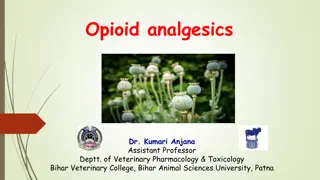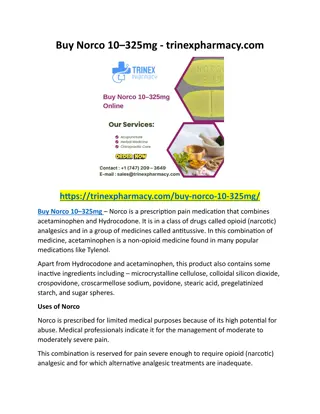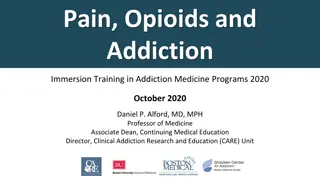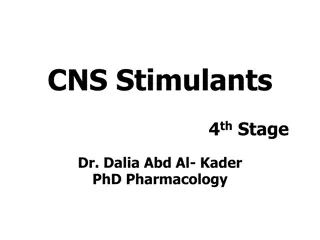Age-Friendly App: Managing Drug-Drug Interactions Between Prescriptions and OTC Analgesics
The Age-Friendly app addresses the crucial issue of drug-drug interactions between current prescriptions and over-the-counter analgesics in the geriatric population. With a significant percentage of OTC sales attributed to older adults, there is an increased risk of adverse drug events due to polyph
1 views • 25 slides
Pharmaceutical Chemistry Analgesic Agents Narcotic Analgesics
Analgesic agents play a crucial role in managing pain, ranging from mild to severe, with different categories such as opioids, NSAIDs, and triptans. The origin of pain can vary from physiological to neuropathic causes. Opioids target opioid receptors, with discoveries in endogenous ligands like enke
4 views • 49 slides
Understanding Narcotic Analgesics and Opiates: History, Mechanisms, and Uses
Delve into the world of narcotic analgesics and opiates, exploring the history of opium poppy, morphine derivatives, opioid compounds, and the pharmacology mechanisms of action. Discover the uses of opiates in analgesia, preanesthetic medication, and more, alongside the endogenous ligands involved.
8 views • 55 slides
Performance-Enhancing Drugs in Sports: Types and Effects
Anabolic steroids, beta-blockers, diuretics, narcotic analgesics, and peptide hormones are commonly used in sports to enhance performance. Each drug has specific advantages and disadvantages, impacting athletes' physical and mental health. While some drugs enhance muscle growth and speed up recovery
0 views • 8 slides
Understanding Opioid and Non-Opioid Analgesics in Pain Management
Opioid analgesics, such as morphine, act in the central nervous system to relieve pain without affecting consciousness. They differ from non-opioid analgesics like aspirin in terms of CNS depression, pain type targeted, and addiction potential. Pain is a protective mechanism caused by tissue damage
0 views • 25 slides
Buy Norco 10–325mg - trinexpharmacy.com
Buy Norco 10\u2013325mg \u2013 Norco is a prescription pain medication that combines acetaminophen and Hydrocodone. It is in a class of drugs called opioid (narcotic) analgesics and in a group of medicines called antitussive. \nContact : 1 (747) 209
0 views • 16 slides
Otitis Externa: Overview, Risk Factors, and Treatment
Otitis externa, also known as swimmer's ear, is an inflammation of the external auditory canal. It can be acute or chronic and is common among individuals aged 7-14 years. The main causative organisms include Pseudomonas aeruginosa and Staphylococcus aureus. Risk factors include swimming in pools, h
0 views • 10 slides
Buy Ultram 50mg Online - ups-pharmacy.com
Buy Ultram 50mg Online is used to help relieve moderate to moderately severe pain (opioid pain medication). Tramadol is similar to narcotic analgesics. It works in the brain to change how your body feels and responds to pain.\nText\/ WhatsApp: 1 78
1 views • 4 slides
Understanding Drug Administration in Dentistry: Safety and Considerations
Drug administration is common in dental practice, with categories including local anesthetics, analgesics, antibiotics, and CNS depressants. Safety, rational use, and principles of toxicology play vital roles in preventing adverse reactions and emergencies. Proper administration is crucial for effec
0 views • 76 slides
Understanding Pain and Analgesics in Medical Science
Pain is a complex sensory and emotional experience linked to tissue damage, with various types of nerve fibers and nociceptors playing key roles in its perception. Pain mediators like bradykinin and prostaglandins modulate sensitivity to pain stimuli. Analgesics, including non-opioid NSAIDs and opio
0 views • 23 slides
Sedation, Analgesia, and Paralytics in the ICU: A Comprehensive Guide
This comprehensive guide delves into the use of sedatives, analgesics, and paralytics in the intensive care unit (ICU). It covers various medications like Etomidate, Propofol, Ketamine, Benzodiazepenes, and Dexmedetomidine, detailing their indications, dosages, and effects. Understanding the role of
0 views • 21 slides
AHCCCS Pharmacy and Therapeutics Committee Recommendations May 23, 2023
The AHCCCS Pharmacy and Therapeutics Committee made recommendations on various drug classes, including Analgesics, Narcotics, Antibiotics, Inhaled, Anticoagulants, and Antimigraine Agents. The recommendations specify preferred products and changes in preferred status for certain medications. Brand p
0 views • 45 slides
Understanding Foot Rot and Digital Dermatitis in Ruminants
This detailed presentation covers Foot Rot (Bovine Foot Rot) and Digital Dermatitis (DD) in ruminants, discussing the etiology, symptoms, treatment, prevention strategies, and more. Foot Rot is caused by Fusobacterium necrophorum while DD is a contagious disease involving multiple bacteria. Treatmen
0 views • 17 slides
Understanding Chronic Pain, Opioids, and Addiction in Medicine
Chronic pain is a complex issue that can impact individuals on various levels. It is important to understand the subjective nature of pain and the barriers to adequate pain care. Opioid analgesics, while effective in managing pain, come with risks such as side effects, addiction, and overdose potent
0 views • 28 slides
Understanding Common Colds and Respiratory Infections
The majority of respiratory illnesses, such as the common cold, are caused by viruses, leading to short-lived immunity. Symptoms include nasal congestion, sore throat, cough, and fatigue. While most cases resolve without specific treatment, complications like sinusitis or pneumonia may occur. Antibi
0 views • 17 slides
Understanding Common Equipment and Systems in ICU
Common equipment in an ICU includes mechanical ventilators, cardiac monitors, monitoring equipment for bodily functions, and a variety of tubes, lines, and pumps. Drugs like analgesics are used to reduce pain and prevent infections. Monitors track heart rate, blood pressure, and temperature, while t
0 views • 48 slides
Overview of Narcotic Analgesics and Opioids
Narcotic analgesics, such as opiates and opioids derived from opium, interact with specific opioid receptors in the body to produce analgesic effects. Different opioid receptors have varying effects, with mu (MOP) being a good analgesic but with adverse effects, delta (DOP) and kappa (KOP) have nuan
0 views • 6 slides
Mechanism and Clinical Uses of CNS Stimulants
CNS stimulants, including psychomotor stimulants and hallucinogens, have diverse clinical uses but are also potential drugs of abuse. Psychomotor stimulants such as caffeine affect the CNS by translocating extracellular calcium, increasing cyclic adenosine monophosphate, and blocking adenosine recep
0 views • 29 slides
Comprehensive Guide to Ketamine Use in Palliative Medicine: Indications, Effects, and Dosage
Ketamine, a Schedule 2 controlled substance, is utilized as a third-line analgesic for managing complex pain conditions. Acting as an N-methyl-D-aspartate (NMDA) receptor inhibitor, it exerts analgesic effects by antagonizing the NMDA receptor, impacting neuronal hyperexcitability and reducing opioi
0 views • 17 slides


















